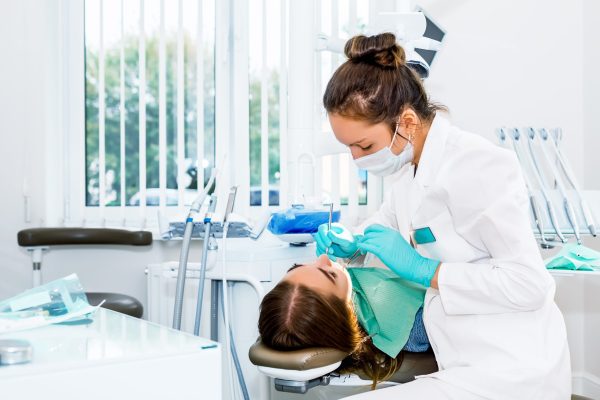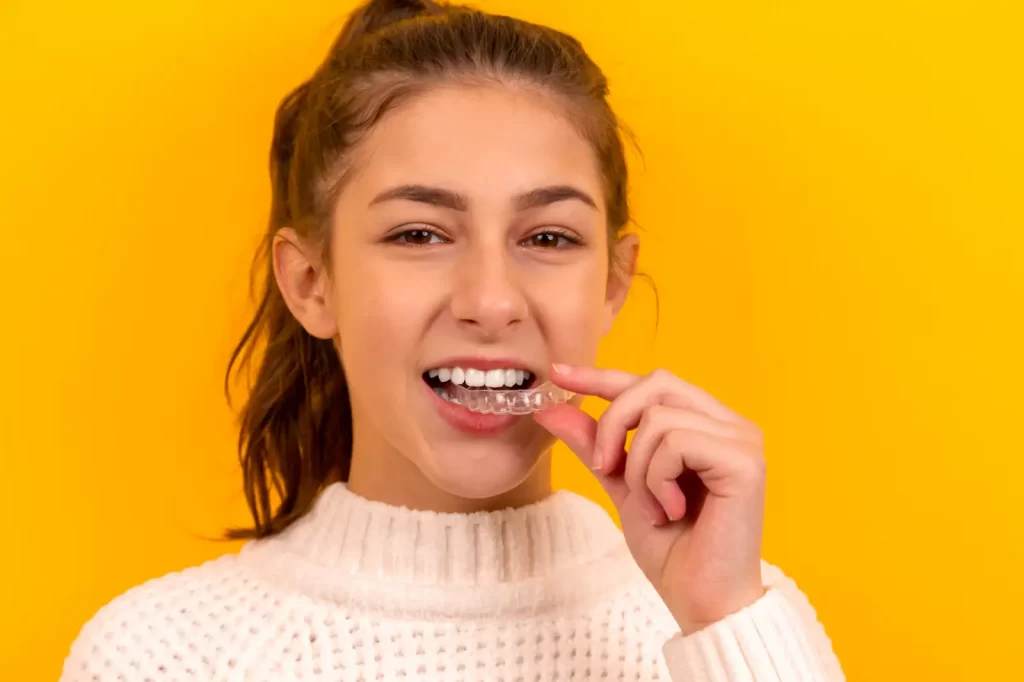Learning About Advanced Dentistry With Dr. Gropp
When it comes to maintaining a healthy smile, sometimes traditional dental treatments aren’t enough to address more complex oral health concerns. If you’re struggling with teeth grinding (bruxism), jaw clenching, or other issues that affect your oral health and comfort, advanced dentistry may be the solution. At Dr. Kevin H. Gropp’s practice in Northridge, CA, we offer advanced treatments such as custom night guards to help protect your teeth and improve your overall quality of life.
In this page, we’ll dive into advanced dentistry and explore how night guards can offer effective relief and protection for patients dealing with the damaging effects of bruxism and jaw clenching. If you have additional questions, reach out to us today at 818-709-8645 to book your appointment with our Northridge, CA, dentist. Dr. Gropp also proudly serves patients in Northridge, Porter Ranch, Van Nuys, Reseda, and surrounding areas.
 What Is Advanced Dentistry?
What Is Advanced Dentistry?
Advanced dentistry refers to specialized dental treatments that go beyond the scope of routine care, focusing on managing complex oral health problems. It combines the latest in dental technology and innovative techniques to provide solutions for issues such as tooth wear, jaw pain, TMJ disorders, and more. For instance, bruxism, which can affect adult teeth, may require the use of mouth guards to prevent further damage. Consulting a healthcare professional, such as a dentist or doctor, is crucial for managing these complex conditions effectively.
At Dr. Gropp’s practice, we focus on preventive care, diagnostic precision, and personalized treatments to ensure your long-term dental health. Advanced dentistry is often used to address conditions that may not be treatable with basic dental care, helping to preserve both the function and appearance of your smile.
Understanding Bruxism
Bruxism is a condition characterized by involuntary grinding, clenching, or gnashing of teeth. It can occur while awake or asleep, and people are generally not aware of their teeth grinding during sleep. Bruxism can lead to dental damage, headaches, jaw pain, and other issues. Anyone can develop bruxism, but it’s most common during childhood, adolescence, and young adulthood.
What is Sleep Bruxism?
Bruxism is a condition where individuals grind, clench, or gnash their teeth unconsciously. This can happen both during the day and at night, with sleep bruxism being particularly problematic as individuals are often unaware they are grinding their teeth. The condition can lead to a range of issues, including jaw pain, headaches, and significant dental damage. While bruxism can affect anyone, it is most frequently observed in children, adolescents, and young adults.
Bruxism Causes
The exact cause of bruxism remains unclear, but several factors are known to contribute to its development. Stress and anxiety are major triggers, often leading to increased muscle tension and teeth grinding. Sleep disorders, such as sleep apnea and insomnia, are also linked to bruxism, as disrupted sleep patterns can exacerbate the condition. Additionally, misaligned teeth or an abnormal bite, issues with the temporomandibular joint (TMJ), certain medications like antidepressants and antihistamines, and even genetic predispositions can all play a role in the onset of bruxism. Incorporating beverages like turmeric milk and herbal tea into your routine may help reduce teeth grinding by promoting relaxation and reducing stress, though they should be part of a broader approach to managing the issue.
Diagnosing Bruxism
Evaluation and Diagnosis
Diagnosing bruxism typically involves a combination of physical examinations, medical history reviews, and symptom assessments. During regular dental check-ups, dentists look for signs of bruxism, such as worn tooth enamel, increased tooth sensitivity, and damage to the inside of the cheeks. If bruxism is suspected, the dentist will monitor the condition over several visits, checking for any changes or worsening symptoms that may require intervention. In some cases, a sleep study, known as polysomnography, may be recommended to confirm the diagnosis, especially if sleep disorders like sleep apnea are suspected. Regular dental exams are crucial for early detection and management of bruxism, ensuring that any potential issues are addressed promptly to prevent further damage.
Treating Bruxism
Treating bruxism typically involves a combination of dental treatments, therapies, and lifestyle changes. The goal of treatment is to reduce the frequency and severity of teeth grinding and clenching, alleviate jaw pain and discomfort, and prevent further tooth damage. Addressing bruxism early can help protect your oral health and improve your overall quality of life.
Dental Treatments
Dental treatments for bruxism are designed to protect your teeth and reduce the impact of grinding and clenching. These treatments may include:
- Mouth Guards: Custom-made mouth guards, also known as night guards, are worn at night to protect your teeth from grinding and clenching. These guards are tailored to fit your upper or lower teeth, providing a comfortable and effective barrier that reduces the risk of tooth damage and jaw pain.
- Bite Adjustments: If a misaligned bite is contributing to your bruxism, a dentist may recommend bite adjustments. This process involves reshaping the surfaces of your teeth to improve alignment and reduce grinding and clenching.
- Dental Restorations: For teeth that have been damaged due to bruxism, dental restorations such as crowns, bridges, or implants may be necessary. These restorations help repair or replace damaged teeth, restoring their function and appearance.
Therapies and Medicines
In addition to dental treatments, various therapies and medicines can help manage bruxism symptoms. These may include:
- Stress Reduction Techniques: Since stress is a common trigger for bruxism, incorporating stress reduction techniques into your daily routine can be beneficial. Practices such as meditation, yoga, and deep breathing exercises can help reduce stress and alleviate bruxism symptoms.
- Relaxation Techniques: Techniques like progressive muscle relaxation and visualization can help reduce muscle tension and promote relaxation, making it easier to manage bruxism.
- Biofeedback Therapy: Biofeedback therapy involves using sensors to monitor muscle activity and provide feedback. This helps individuals become aware of and control their muscle tension, reducing the frequency and severity of teeth grinding.
- Medicines: In some cases, medications such as muscle relaxants or antidepressants may be prescribed to help manage bruxism symptoms. These medicines can help reduce muscle tension and alleviate jaw pain.
Managing Jaw Pain and Teeth Grinding
Managing jaw pain and teeth grinding requires a combination of lifestyle changes, home remedies, and professional treatments. By addressing the underlying causes and implementing practical strategies, you can reduce symptoms and improve your overall well-being.
Lifestyle and Home Remedies
Lifestyle changes and home remedies can play a significant role in alleviating jaw pain and teeth grinding. Consider incorporating the following tips into your daily routine:
- Avoiding Stimulating Substances: Reducing or eliminating caffeine, nicotine, and alcohol can help decrease muscle activity and promote relaxation, reducing the likelihood of teeth grinding.
- Eating a Balanced Diet: A diet rich in fruits, vegetables, and whole grains can help reduce inflammation and support overall health, which may help alleviate bruxism symptoms.
- Staying Hydrated: Drinking plenty of water throughout the day can help reduce muscle tension and promote relaxation, making it easier to manage jaw pain and teeth grinding.
- Avoiding Hard Foods: Steering clear of hard foods such as nuts, tough meats, and hard candies can help reduce the strain on your jaw muscles and prevent teeth grinding.
- Practicing Good Sleep Habits: Establishing a consistent sleep schedule, avoiding screens before bedtime, and creating a relaxing sleep environment can help reduce stress and promote relaxation, which may help alleviate bruxism symptoms.
By implementing these lifestyle changes and home remedies, you can take proactive steps to manage jaw pain and teeth grinding, improving your overall quality of life. If symptoms persist, it’s important to consult with a healthcare professional for further evaluation and treatment.
What Are Night Guards for Teeth Grinding?
A night guard, also known as mouth guards, is a custom-made dental appliance designed to protect your teeth from the harmful effects of grinding and clenching, which often occurs during sleep. Night guards help create a physical barrier between your upper and lower teeth, reducing the impact of excessive force on your teeth, gums, and jaw muscles.
While over-the-counter solutions may seem like an easy fix, custom night guards are tailored specifically to fit your teeth and mouth, ensuring maximum comfort and effectiveness. Dr. Gropp creates personalized night guards that are not only durable but also comfortable to wear throughout the night.
How Do You Know if You Need Advanced Dentistry for Jaw Pain?
You may need advanced dentistry if you’re experiencing any of the following symptoms related to bruxism or jaw clenching:
- Teeth Grinding: Waking up with sore teeth or jaw muscles, or noticing signs of excessive wear on your teeth.
- Jaw Pain or Tension: Pain or discomfort in your jaw, face, or neck, especially upon waking.
- Headaches: Morning headaches or migraines caused by muscle tension in the jaw.
- Cracked, Chipped, or Worn Teeth: Damage to your teeth from constant grinding or clenching, including cracks or worn-down enamel.
- TMJ Disorders: Pain or clicking in the temporomandibular joint (TMJ), which connects the jaw to the skull.
Custom night guards can be designed to fit over your upper or lower teeth, providing comprehensive protection against grinding and clenching.
If you’re experiencing any of these symptoms, it’s time to consider advanced dental treatments like custom night guards. Dr. Gropp can assess your situation and recommend the best solution to protect your oral health.
 Protect Your Smile with a Custom Night Guard for Teeth Grinding
Protect Your Smile with a Custom Night Guard for Teeth Grinding
If you suspect that you may need a night guard or are experiencing symptoms of bruxism, don’t wait until the damage is done. Contact Dr. Kevin H. Gropp’s Northridge, CA, dental office to schedule a consultation and learn how we can help treat teeth grinding. Dr. Gropp and his team specialize in advanced dentistry, offering customized solutions like night guards to help you protect your teeth, reduce discomfort, and improve your overall well-being.
Call us today at 818-709-8645 or fill out our online contact form to book your appointment with our Northridge, CA, dentist. Dr. Gropp also proudly serves patients in Northridge, Porter Ranch, Van Nuys, Reseda, and surrounding areas.

